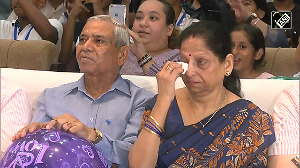The standing committee on petroleum and natural gas has recommended that the government rationalise the duty structure on petroleum products so that there was no cascading effect of the increase in international prices on customers.
In its report tabled in the Lok Sabha on Wednesday, it also asked the government to set up a price stabilisation fund to bring in stability in the prices of petroleum products. The fund could be created using the money collected from cess on indigenous crude.
Stating that changes in the duty structure projected by the government was revenue neutral were adding an incremental revenue of Rs 3,000 crore (Rs 30 billion) to the central coffers, the committee apprehended that 'the added burden on excise front would be passed on to customers in the name of exorbitant rise in international prices of these products.'
The committee in its report recommended that any price reform in the oil sector should keep the interests of the customers in mind and attempt at rationalising and adjusting the duty structure in such a way that the cascading effect of the international prices.
It said that the government was too heavily dependent on the oil sector to mobilise its revenues. The oil sector contributed a giant share of the total revenue of the government through customs duty, excise duty, sales tax, cess, royalty and dividends from oil PSUs.
The sector contributed Rs 10,582.21 crore (Rs 105.822 billion) as customs duty and Rs 40,150.58 crore (Rs 401.505 billion) as excise duty during 2003-04.
The percentage share of the customs duty in the gross revenue of the government is 21.77 per cent and that of excise duty is 44.17 per cent.
The committee also recommended that the subsidy on kerosene sold through the public distribution network and domestic LPG should be continued beyond March 31, 2007 when it was scheduled to be phased out.
"A part of this subsidy can be borne by the oil companies and the rest from the cess collected on indigenous crude," said the report.
| CPM seeks duty rollback
The CPI(M) today quoted a standing committee report on petroleum duties to press for a withdrawal of the decision to raise excise duty petroleum products. Party MP Nilotpal Basu read out from the report to argue that the Customs and excise duty changes made by the finance minister in during the Budget were not "revenue neutral" as he had claimed, but that the government stood to gain by Rs 3,000 crore (Rs billion). |
| Euro IV may be put off
The government will review the deadline for implementation of Euro IV equivalent norms. The auto-fuel policy had recommended Euro IV norms for 11 cities and Euro III in rest of the country from 2010 but officials said a review would be done next year after studying the impact of Euro III norms. |






